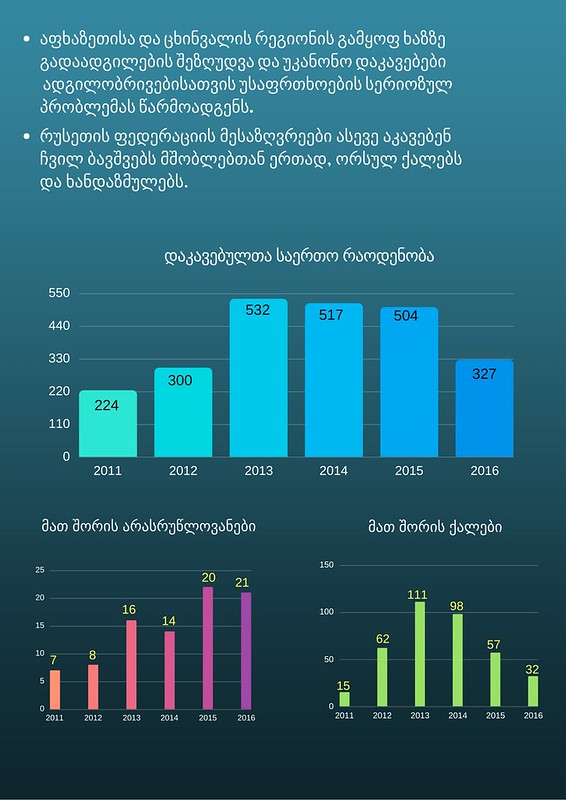Presentation of Special Report on Rights Situation of Conflict-Affected Population
On June 8, 2017, at the presentation of a special report on the rights situation of the conflict-affected population, the Public Defender reviewed the safety and social situation in the villages alongside the dividing lines and in the occupied territories, and presented recommendations aimed at improving the rights situation of the conflict-affected population.
Cases of murder, detention and disappearance were observed in the occupied territories, as well as territories under the Georgian control, in 2016. At the Khurcha-Nabakevi checkpoint, the so-called Abkhazian border guard ran after a civilian, G.O., and killed him on the territory controlled by Georgia; citizen N.S. disappeared from the dividing line in the Gori village of Korda and remains missing up to now; the futile talks on these cases clearly demonstrate the absence of a real cooperation between the parties, which delays the investigation and hinders the establishment of the truth.
Regular detentions of locals are still worrying. In 2016, the number of detainees at the Shida Kartli dividing line amounted to 134, including 14 women and 8 juveniles. The Tskhinvali de-facto court sentenced citizen G.G., detained in 2016, to 20-year imprisonment. In total, the number of persons detained at the Shida Kartli dividing line in 2011-2016 reaches 826.
The exact number of the individuals arrested at the Abkhazian dividing line is unknown. According to the data of the State Security Service of Georgia, 193 arrests were made in 2016, including 18 women and 13 juveniles. However, this data is only 5-10% of the real number of the detainees. According to the Russian Border Forces, they arrested 14,000 people at the Abkhazian dividing line in 2009-2016.
Despite the Government's important social and infrastructure projects, the residents of the villages alongside the Samegrelo and Shida Kartli dividing lines still suffer from the severe damage caused by the war. The main problem remains to be the lack of the source of income.
The unresolved conflict and politicization of the humanitarian issues have a particularly severe impact on minors. The detentions of children, including infants, and their parents, at the Abkhazian dividing line are worrying. In 2016, the Public Defender was informed of a number of cases, during which, improper and degrading treatment, including verbal abuse, restrictions on the food and drinking water, took place at the Russian military bases.
It is welcome that an agreement was reached on the release of 18 prisoners in 2016. 4 persons were released by the Georgian side, 10 – by the Sokhumi de facto authorities and 4 – by the Tskhinvali de facto authorities. The Public Defender had been raising this issue since 2014 and therefore, he positively evaluated the dialogue launched between the Georgian and the de facto authorities.
Another positive development in 2016 was the resumption of the Incident Prevention and Response Mechanism meetings in Gali after a 4-year break. However, the obstacles in the entry of international human rights organizations in the occupied territories remain unresolved. The number of international donor or non-governmental organizations that strengthen the Abkhaz and Ossetian civil societies is also low. This will negatively affect the rights situation of the people living in the conflict regions.
Despite the fact that the Georgian authorities cannot control Abkhazia and so-called South Ossetia, it has a positive obligation to influence the rights situation of people living there through political, legal or diplomatic means. Accordingly, the Public Defender considers that the Government's policy should be maximally aimed at protecting the rights and freedoms of people living alongside the dividing line and in the occupied territories, improving their social and economic situation, increasing access to quality education and healthcare, and engaging the conflict regions in the economic relations of Georgia. For this purpose, it is necessary the Government to develop a coordinated, flexible and needs-based mechanisms for the conflict-affected population both at the legislative and practical levels.
The presentation of the special report was attended by representatives of the Georgian Government, the diplomatic corps, and international and local organizations.
See the electronic version of the report
















